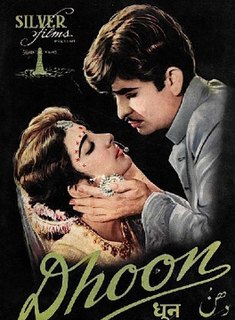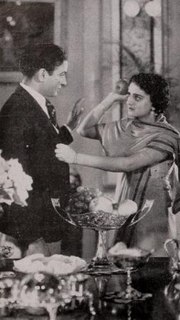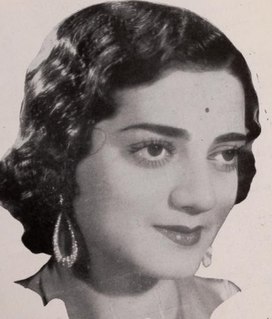Related Research Articles

Kishore Sahu was an Indian actor, film director, screenwriter, and producer. He appeared in 22 films between 1937 and 1980, and he directed 20 films between 1942 and 1974.
Musafir is a 1940 social Hindi language film directed by Chaturbhuj Doshi. Produced by Ranjit Studios, the music was by Gyan Dutt and it starred Noor Mohammed Charlie, Khursheed, Ishwarlal and Yakub.

Dhoon is a 1953 Bollywood film directed by M. Kumar. The film was produced by Silver Kings, a production company formed by Kumar and his then wife, actress Pramila. The film stars Raj Kapoor, Nargis, Motilal, Kumar, Pramila, E. Bilmoria, Leela Mishra and Kamal Mehra. Mehra was a lesser known comedian who started his career in 1951 with Naujawan. He went on to act in several films before starting his own production company Pride Of India under which he made films like Kismat (1968), Mahal (1969) and Naami Chor (1977). The music was by Madan Mohan.

Bansari is a Bollywood social film. It was released in 1943. Music composition was by Gyan Dutt with lyrics written by D. N. Madhok. The film was produced by Chandulal Shah for Ranjit Studios. Directed by Jayant Desai, it starred Ishwarlal, Noor Mohammed Charlie, Dixit, Shamim Akhtar, Kesari and Urmila.
Jayant Desai was an Indian film director and producer. After graduating from the University of Bombay Desai joined Ranjit Studios in 1929 where he directed numerous films including Toofani Toli (1937), Tansen (1943), Har Har Mahadev (1950) and Amber (1952). Tansen was the second highest grossing Indian film of 1943. Besides film direction he also acted in several films. In 1943 he left Ranjit Studios to found his own production company, Jayant Desai Productions. In 1960s he founded Jupiter Films and Hemlata Pictures.
Aap Ki Marzi is 1939 Hindi romantic comedy film directed by Sarvottam Badami. The film was produced under the Sudama Productions banner. The music composer was Gyan Dutt with lyrics credited to Pyare Lal Santoshi and S. P. Kalla. It starred Motilal, Sabita Devi, Khursheed, K. N. Singh, Mazhar Khan, Vasanti and Sunalini Devi. This was director Badami's second comedy film; he had earlier directed the comedy Teen Sau Din Ke Baad (1938) which turned out be a box office success. Aap Ki Marzi was based on the MGM produced, Edward Buzzell directed film Paradise for Three (1938) from Erich Kastner's novel.
Chandrahasa is a 1933 Hindi mythological costume drama film directed by Sarvottam Badami. It was the first Hindi film directed by Badami bringing him into prominence, even though he did not know Hindi. It was also one of the first Talkie versions of the film which was remade several times. Produced by Sagar Movietone, it had music composed by S. P. Rane. The film starred Noor Mohammed Charlie, Gulzar, Kamala, Master Bachchu, Dinkar, Mehboob Khan and Baburao Sansare.
Grihalakshmi is a 1934 Hindi social family melodrama film directed by Sarvottam Badami with story by Dr. Jayant Shyam and cinematography by Faredoon Irani. The film was produced by Sagar Movietone and had music by S. P. Rane. The cast included Sabita Devi, Jal Merchant, Yakub, Kamala Devi, K. C. Dey, Swaroop Rani and Asooji.

Teen Sau Din Ke Baad is a 1938 Hindi social comedy film directed by Sarvottam Badami. This was Badami's first comedy film and it was a success at the box-office; he went on to direct two more comedies after this, Aap Ki Marzi (1939) and Ladies Only (1939), also successes. The film was produced by Sagar Movietone, with story written by Babubhai A. Mehta and dialogue by Wajahat Mirza and Waqif. The music was composed by Anil Biswas with lyrics by Zia Sarhadi. The director of photography was Faredoon Irani and the film starred Bibbo, Motilal, Sabita Devi, Yakub, Pesi Patel and Gulzar.
Sajani is a 1940 Hindi social film directed by Sarvottam Badami for Sudama Productions. Scripted by Zia Sarhadi, the film had music by Gyan Dutt and starred Prithviraj Kapoor, Sabita Devi, Snehprabha Pradhan, Noor Jehan, Dixit, and Ghory. Badami left Sagar Movietone where he had made satirical comedies to join his "mentor" Ambalal Patel at Sudama Productions to make "socially relevant film(s)", where Sajani was one of the first. Snehprabha Pradhan acted in several films produced by Chimanbhai Desai in 1940, including Sajani.
Do Diwane also known as Be Kharab Jaan, is a 1936 Hindi comedy film directed by Chimanlal Luhar based on K. M. Munshi's famous play Be Kharab Jaan. The film was produced by Sagar Movietone and had music composed by Pransukh Nayak with cinematography by Keki Mistry. The cast included Shobhana Samarth, Motilal, Yakub, Aruna Devi, Rama Devi, Kamalabai, Kayam Ali, Pande and Pesi Patel.
Tera Naam Mera Naam is a 1988 Hindi language romance comedy film directed by Ramesh Talwar. Karan Shah plays the role of a scheduled caste boy who loves a girl belonging to a higher class. He exchanges his identity with another boy belonging to a higher caste.

Thokar also called The Kick is 1939 Hindi/Urdu film directed by A. R. Kardar. Produced by Chandulal Shah for his production banner Ranjit Movietone, it had music by Gyan Dutt. The story writer was M. Sadiq, with cinematography by Gordhanbhi Patel. The cast included Kumar, Ishwarlal, Madhuri, Yakub, Noor Mohammed Charlie, Ram Marathe, Waheedan Bai and Dixit.

Jeevan Prabhat is a 1937 Hindi film social drama, produced by Bombay Talkies and directed by Franz Osten. The music director was Saraswati Devi with lyrics and dialogues by J. S. Casshyap. The screenplay was by Niranjan Pal. The film's "star value" was Devika Rani, with Kishore Sahu making his debut as an actor in the film. The cast included another debutant, Renuka Devi, with Mumtaz Ali, Maya Devi and M. Nazir.

Chaturbhuj Doshi (1894–1969) was a Hindi and Gujarati writer-director of Indian cinema. He was one of the top Gujarati screenplay writers, who helped script stories for the Punatar productions. He is stated to be one of the leading figures who launched the Gujarati film industry with work on notable films like Gunsundari (1948) and Nanand Bhojai (1948). Doshi, was “well known” for his family socials and had become “a celebrity in his own right”. He made a name for himself as a journalist initially and was referred to as the "famous journalist" and publicist by Baburao Patel, editor of Filmindia.

Sabita Devi (1914–1965) was a Hindi film actress in Indian cinema. She is stated to be one of the "prominent" leading ladies of the "pioneering era" of Indian cinema along with Mehtab, Bibbo, Durga Khote, Gohar, Devika Rani and Seeta Devi. A Jewess by birth, she changed her name to find acceptability in Hindi cinema like the other Anglo-Indian and Jewish actresses of her time, Sulochana, Seeta Devi, Madhuri, and Manorama. After initially working with British Dominion Films Ltd., Calcutta, she shifted to Bombay and performed mainly in films produced by Sagar Movietone with her co-star in most films being Motilal. Some of the popular films with Motilal were Dr. Madhurika (1935) and Kulvadhu (1937) directed by Sarvottam Badami. Their first film together was Shaher Ka Jadoo (1934), which was also Motilal's debut film, and then Lagna Bandhan (1936) both directed by Kaliprasad Ghosh. She acted in Silver King (1935) with Motilal. It was an action film directed by C. M. Luhar, which became a "huge success".

Gorakh Aya is a 1938 Hindi mythology film from Ranjit Movietone. It was the debut directorial venture for Chaturbhuj Doshi, who had made a name for himself as a journalist and publicist. The screenplay was by Gunvantrai Acharya, with dialogues by Pyare Lal Santoshi. The cinematographer was Krishna gopal and music was composed by Gyan Dutt.

Bhudo Advani was an Indian character actor and comedian. He started his acting career in theatre with the notion of spreading awareness on social issues. He came to Bombay on the advice of an Ajanta Cinetone representative and was offered a role in the film Afzal, also called Hoor-E-Haram in 1933, directed by Mohan Bhavnani. He later joined Sagar Movietone, becoming an important fixture in most films produced by them. He turned from character roles to comedy performing in Dr. Madhurika (1935), directed by Sarvottam Badami, Deccan Queen (1936) and Do Diwaane (1936), by C. Luhar.

Eena Meena Deeka is a 1994 Indian comedy film directed by David Dhawan and produced by Nitin Manmohan. It stars Vinod Khanna, Rishi Kapoor and Juhi Chawla. Its plotline is loosely inspired by the 1989 movie Three Fugitives.

Hum Ek Hain is a 1946 Indian Hindi-language film co-written and directed by P. L. Santoshi in his directorial debut. The film stars Durga Khote, along with Kamala Kotnis, Dev Anand, Rehana and Rehman in their cinematic acting debut. It was released on 8 June 1946.
References
- ↑ "Secretary". Gomolo.com. Retrieved 8 December 2014.
- ↑ "Secretary (1938)". muvyz.com. Muvyz, Inc. Retrieved 8 December 2014.
- ↑ "Secretary". Alan Goble. Retrieved 8 December 2014.
- ↑ Sanjit Narwekar Eena Meena Deeka: The Story of Hindi Film Comedy 8129126257 2012 "His first film The Secretary (1938) was a riotous comedy about a rich heiress (Madhuri), who falls in love with her father's secretary (Trilok Kapoor). She inherits her father's business after remember that while they do so, they establish a standard ..."
- ↑ Sanjit Narwekar (12 December 2012). Eena Meena Deeka: The Story of Hindi Film Comedy. Rupa Publications. pp. 62–. ISBN 978-81-291-2625-2 . Retrieved 8 December 2014.
- ↑ Patel, Baburao (April 1938). "Studio Close-ups". Filmindia. 3 (12): 58. Retrieved 8 December 2014.
- ↑ Ashish Rajadhyaksha; Paul Willemen (10 July 2014). Encyclopedia of Indian Cinema. Taylor & Francis. pp. 1994–. ISBN 978-1-135-94325-7 . Retrieved 8 December 2014.
- ↑ Vats, Rohit. "100 Years of Indian Cinema: The founding fathers of motion pictures". innlive.in.com. IBN Live. Archived from the original on 8 December 2014. Retrieved 8 December 2014.